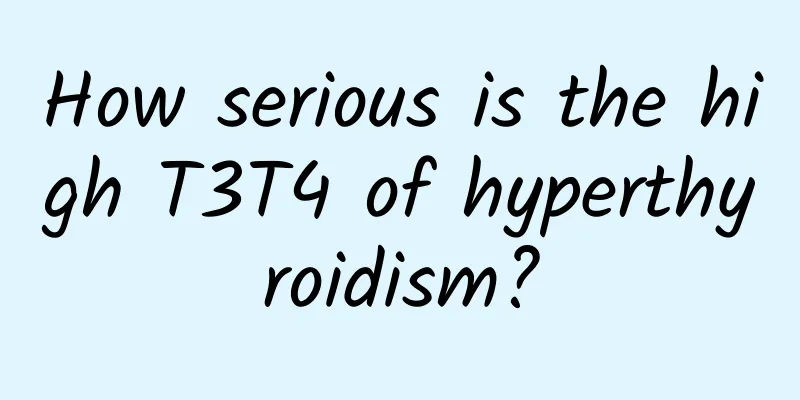How serious is the high T3T4 of hyperthyroidism?

|
How serious is the high T3T4 of hyperthyroidism? Most patients with hyperthyroidism have an enlarged thyroid gland, which can be mild or severe. There are very few patients with hyperthyroidism who do not have an enlarged thyroid gland. Many people with hyperthyroidism also have exophthalmos, which can vary in degree. If the condition is serious, it is recommended to go to the hospital for relevant examinations and treatment, which is the most effective. ①What is the T3T4 value that indicates severe hyperthyroidism? What is the value of T3T4 that indicates severe hyperthyroidism? Nowadays, many people are unfamiliar with the term T3T4. Experts from our hospital said that T3T4 is actually a value of "thyroid T3T4", and hyperthyroidism is a type of thyroid disease. Now everyone wants to know what is the value of T3T4 that indicates severe hyperthyroidism? So, what is the value of T3T4 that indicates severe hyperthyroidism? Let the experts introduce it to you below: 1. T3 and T4 are very important and are the key indicators of thyroid examination. Serum total thyroxine and serum triiodothyronine are hormones synthesized and secreted by thyroid follicular cells. In addition to being synthesized in the thyroid gland, T3 is mainly converted from T4 in peripheral tissues. Most of the T4 and T3 secreted into the blood are bound to thyroxine-binding globulin, and only a very small part is free. Only free T3 and T4 can enter target cells and exert physiological effects. Although the serum concentration of T3 is much lower than that of T4, its physiological effect is several times stronger than that of T4. 2. Increased T3: Hyperthyroidism, hyperTBGemia, iatrogenic hyperthyroidism, TT3 is relatively increased during the treatment of hyperthyroidism and in the early stage of hypothyroidism; TT4 of patients with iodine deficiency goiter may be reduced, but TT3 is normal and also relatively increased; T3 type hyperthyroidism, some hyperthyroidism patients have normal TT4 concentration, reduced TSH, and significantly increased TT3. Decreased: hypothyroidism, low T3 syndrome (seen in various serious infections, chronic heart, kidney, liver, lung failure, chronic wasting diseases, etc.), low TBG blood disease, etc. 3. Increased T4: hyperthyroidism, high TBG blood disease (pregnancy, oral estrogen and oral contraceptives, familial), acute thyroiditis, subacute thyroiditis, acute hepatitis, obesity, eating thyroid tissue rich in thyroid hormone when using thyroid hormone, etc. Decreased: hypothyroidism, low TBG blood (nephrotic syndrome, chronic liver disease, protein-losing enteropathy, hereditary low TBG blood, etc.), panpituitarism, hypothalamic lesions, strenuous activities, etc. To sum up, experts have introduced to you what T3T4 values are considered severe hyperthyroidism. I believe everyone knows it. If you find any abnormalities in yourself, go to the hospital for examination. If you find that the T3T4 values are abnormal, you must go to a regular hospital for examination and treatment of hyperthyroidism in time. |
<<: Hyperthyroidism severity grading
>>: What is the best food for patients with hyperthyroidism?
Recommend
Why do my hands and feet feel numb the day after drinking?
After drinking, if you experience numbness in you...
What to combine with Cuscuta auspiciousness
Cuscuta australis has appeared in many literary w...
What Chinese medicine should I take for toothache?
There are many reasons that can cause toothache, ...
Treatment of sequelae of snake bite
Some diseases, even if cured, will leave sequelae...
What is the cause of bleeding moles on the body?
Many people don’t know why they have anemic nevus...
The efficacy and consumption methods of bitter radish
Kumar is one of the varieties differentiated from...
Dosage of Notopterygium wilfordii
Each type of therapeutic drug has strict requirem...
The most practical contraceptive method
Since human society entered the civilized era, va...
What causes a swollen butthole?
The anus is a relatively private part of our body....
What causes pain on the outside of the breast?
The stinging pain on the outside of the breast is...
Discomfort after each urination
As the saying goes, people have three urgent need...
What are the effects and methods of the Angelica dahurica and Poria cocos freckle removal mask?
Everyone has heard of Poria cocos, right? It is a...
What are the effects and functions of raspberries
Raspberry is actually a kind of fruit. It tastes ...
Can Sanfutie cure rhinitis?
Rhinitis is a nasal disease caused by bacteria an...
Hepatobiliary stones symptoms
There are many types of diseases, and different d...









